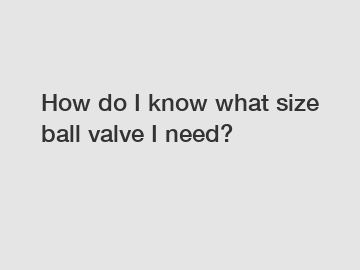How do I know what size ball valve I need?
How do I know what size ball valve I need?
Ball valves are essential components in many industries, allowing for efficient flow control and shut-off capabilities. When it comes to selecting the right size ball valve, it's crucial to understand your specific needs and requirements. In this article, we'll delve into the various factors you should consider when determining the appropriate size for a ball valve.
1. Flow rate:

The flow rate is one of the most critical factors to consider when determining the size of a ball valve. To calculate the required size, you need to determine the maximum flow rate in gallons per minute (GPM) or cubic meters per hour (m3/h) that the valve needs to handle. This information is usually available in the technical specifications of the equipment or system you are working with. Choosing a valve with a diameter too small may result in flow restriction, while selecting one too large may lead to excessive pressure drops and inefficiency.
2. Pipe size:
Matching the ball valve's size to the pipe it will be installed in is crucial. The size of the valve must be equivalent to the pipe's nominal diameter. For instance, if you have a 1-inch diameter pipe, you should select a 1-inch diameter ball valve. Using the correct match ensures seamless installation, minimizes potential leaks, and maintains system integrity.
3. Pressure rating:
Another important aspect to consider when determining the size of a ball valve is its pressure rating. This refers to the maximum allowable pressure that the valve can withstand without failure. It is essential to choose a ball valve with a pressure rating higher than the maximum operating pressure expected in the system. Failure to do so could lead to catastrophic consequences, including leaks or valve ruptures. The pressure rating is usually indicated on the valve and should be cross-checked with the system's requirements.
4. Application-specific factors:
In some cases, additional application-specific factors need to be considered when determining the size of a ball valve. These factors may include the nature of the fluid or gas being controlled, temperature variations, and the presence of any contaminants. For instance, highly corrosive fluids may require a valve made from special materials or coatings to ensure longevity. Understanding the unique requirements of your application will help in selecting the appropriate ball valve size.
Conclusion:
Determining the correct size for a ball valve is crucial for achieving optimal flow control and ensuring the integrity and efficiency of the system. By considering the flow rate, pipe size, pressure rating, and any application-specific factors, you can confidently select the right size ball valve for your needs. Always consult the technical specifications of the equipment and system, and when in doubt, seeking advice from industry experts or valve manufacturers is highly recommended. Remember, choosing the right size ball valve will contribute to the smooth operation and longevity of your system.
For more big size gate valve, cast iron gate valve china, hydraulic control valve price chinainformation, please contact us. We will provide professional answers.

Comments